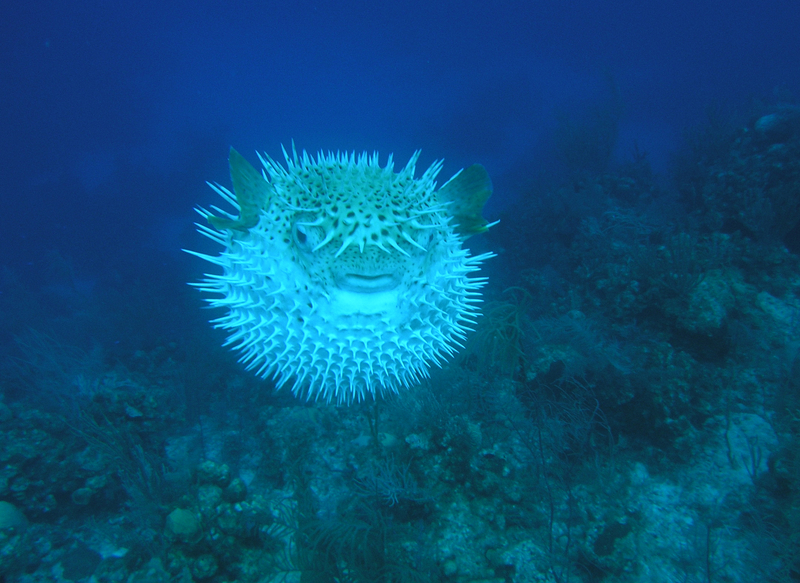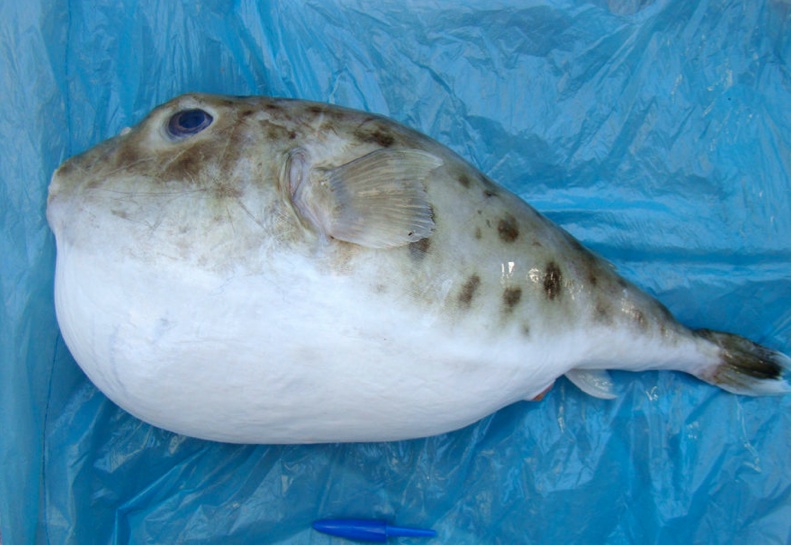Close Call! Accidental Pufferfish Diners All Recover

Eleven people in Brazil who mistakenly ate a poisonous pufferfish all recovered, and left the hospital, according to a new report of the case.
Three of the patients had severe symptoms, such as cardiac arrest and respiratory failure, after eating the pufferfish, but no one died, the report said. Pufferfish contain a potent neurotoxin called tetrodotoxin, and eating the fish can kill a person.
The poisoning happened in October, when a group of 22 people gathered for lunch in Duque de Caxias, a city on the South Atlantic coast of Brazil, the researchers said. The man who caught the fish, which was likely a venomous spotted pufferfish (Sphoeroides), discarded a second, larger pufferfish from his catch, but the smaller ones escaped his notice, according to the report.
The pufferfish, along with the other fish in the catch, ended up at a relative's house, where a woman prepared them for lunch. [Dangers in the Deep: 10 Scariest Sea Creatures]
"A lady cleaned the fish, prepared and cooked the fillets, unaware that the small pufferfish remained between the fish sent by a relative," said Dr. Vidal Haddad Junior, an associate professor of dermatology at SãoPaulo State University and the report's lead author.
About 20 minutes after the meal started, 11 people felt a tingling or prickling sensation on their lips and mouths. The diners then developed nausea, vomiting and muscle problems, the researchers said.
It was then that the family realized they had eaten pufferfish, and their friends rushed them to various hospitals, the researchers said. Eight people had moderate symptoms, such as mild muscular weakness. But three people — one adult and two children — landed in intensive care. The adult went into cardiac arrest, and one child had dilated pupils. Both of them stopped breathing and had to be placed on ventilators.
Sign up for the Live Science daily newsletter now
Get the world’s most fascinating discoveries delivered straight to your inbox.
By a few days later, the patient's bodies had metabolized and excreted the tetrodotoxin, and they were discharged from the hospital.
Perilous poison
Pufferfish can't make tetrodotoxin on their own. Bacteria that live in the fish synthesize the neurotoxin, which blocks the sodium channels in specific nerve cells in humans. In the absence of the poison, sodium excites nerve cells and allows them to contract muscles. Since tetrodotoxin blocks the channels, it often leads to muscle weakness or paralysis.
Paralysis that affects the diaphragm and the intercostal muscles in the chest can lead to respiratory failure, which is "the main agent of death" in cases of pufferfish poisonings, Haddad told Live Science in an email.

"The individual remains conscious during the process, leading to a terrible situation, what we call, 'the cell prison syndrome,'" in which the person is awake but cannot move, Haddad said.
Tetrodotoxin has no known antidote, but doctors typically try to remove the poison by pumping people's stomachs. Physicians also help the patients to breathe, Haddad said. [In Photos: The Power of Poison Through Time]
For the adult in the Brazil case who experienced cardiac arrest, the heart likely stopped because of a shortage of oxygen, said Bill Atchison, a professor of pharmacology and toxicology at Michigan State University, who was not involved in the report.
"What likely happened there was that [the adult] wasn't breathing, so the heart wasn't getting oxygen," Atchison said. "If you don't get oxygen to the heart, then that's essentially the same thing as having a heart attack."
As for the child with dilated eyes, "There are nerves there that control smooth muscle, which regulates how wide your pupil is," Atchison said. "If those are blocked, then the pupils will dilate."
Fugu daredevils
Pufferfish meat is popular in several Brazilian states. There are ways to eat it safely, and those who get sick often recover, unless they are far from medical care, Haddad said.
"The fishermen communities know the risks," he said. "This has to do with poverty, with the difficulties in which they live."
Haddad and his colleagues published the findings of a series of 23 accidents and three deaths in the Brazilian states of Santa Catarina and Bahia, and another report on the death of a child in a community where people knowingly ate the Sphoeroides pufferfish.
"In my data, about 80 percent recovered, with variable manifestations," he said.
In Japan, about 50 people are poisoned each year from eating raw pufferfish meat called fugu, and these cases have a high death rate, Haddad said. The meal is so risky to eat that only a few licensed chefs are able to legally serve the dish.
"If they're licensed by the federal government, they'll actually have a little flag with a pufferfish out front," Atchison said.
Some daredevils ask the chef to leave a small amount of the liver or the ovaries — the parts of the fish with the most toxin — in the fugu. In extremely small quantities, tetrodotoxin can cause a tingling sensation on the lips and tongue without leading to muscle weakness or paralysis. "That's considered to be the ultimate thrill," Atchison said.
Tetrodotoxin is so virulent that some people have wondered whether it could be a biohazard in the hands of terrorists, but "it would be very difficult to do that," Atchison said. "The person who is preparing the fish would have to know what they are doing, so they didn't poison themselves accidently by licking their finger or rubbing their eyes," he said.
The report was published Dec. 9 in the Journal of Venomous Animals and Toxins including Tropical Diseases.
Follow Laura Geggel on Twitter @LauraGeggel. Follow Live Science @livescience, Facebook & Google+. Original article on Live Science.

Laura is the archaeology and Life's Little Mysteries editor at Live Science. She also reports on general science, including paleontology. Her work has appeared in The New York Times, Scholastic, Popular Science and Spectrum, a site on autism research. She has won multiple awards from the Society of Professional Journalists and the Washington Newspaper Publishers Association for her reporting at a weekly newspaper near Seattle. Laura holds a bachelor's degree in English literature and psychology from Washington University in St. Louis and a master's degree in science writing from NYU.









